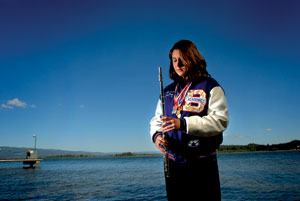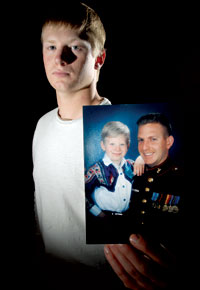When two passenger airliners crashed into the World Trade Center Towers, 2008 Bigfork High School graduate Kelsey Smith was just 11 years old. She holds the same memory of the day’s events as most of her peers – sitting with the rest of the sixth-grade class, quietly watching the news for the duration of the school day.
Soon war started in Afghanistan, then later in Iraq. For the high school class of 2008, the fighting in these countries has been ongoing since they were kids in middle school. Theirs is the first senior class to have the Iraq War in the background every year of its high school career.
This year, six students from Bigfork High School are committing to the military in some form, whether it’s an academy, joining Reserve Officers’ Training Corps (ROTC) or enlisting. Five graduates from Columbia Falls High School are joining the military, and two from Whitefish High School have expressed interest. Exact numbers were unavailable at Flathead High School, but FHS seniors estimate it at around a dozen. As a new school, Glacier High School didn’t have a graduating class this year.
When you ask local seniors, most say they know someone mulling the idea of enlisting in the military, or know someone – a friend, a relative, a community member – who is already serving in a combat zone. Students like Smith, who leaves next week for basic cadet training and then school at the United States Air Force Academy, or Bigfork’s Josh Hunter, who plans to enlist in the Navy, face the possibility of going to war – some as soon as next year.
“I stopped paying attention to it once I enlisted, stopped watching the news as much,” Hunter, 18, said. “I understand it’s a real possibility, but I know this is the right decision for me and I don’t need to freak myself out over it.”
Other military-bound students take a similarly relaxed approach when asked about combat. It’s not that they haven’t thought about it; they’ll assure you they have and offer well-thought-out reasons for their decisions. It’s that, for them, the risk of combat doesn’t outweigh the benefits, which are uniquely tailored to each teen.
Smith, a former cheerleader, valedictorian, soccer player, track athlete, newspaper editor, and speech-and-debate competitor, doesn’t initially seem like a natural fit for the military. But while she’s bubbly and gregarious, Smith, 18, is also driven, loves a challenge and relishes defying stereotypes.
 |
|
Bigfork High School graduate Kelsey Smith’s, 18, letterman jacket is adorned with pins and medals. Along with playing flute in band, she played soccer, ran track, was a cheerleader and participated in speech and debate. Smith hopes the Air Force Academy will help her become an astronautical engineer. |
“I know what I want to do and I think this is the best way to get there,” Smith, who wants to become an astronautical engineer and dreams of going to space, said. “And if that takes me to Iraq, then that’s what it takes.”
At one acclaimed engineering school Smith toured, the guide said the school didn’t have a football team because science and math majors usually didn’t like to get their hands dirty. It was an immediate turnoff for Smith who says at the academy she’ll be with other “science nerds,” but ones who “can still do pushups and run a mile.”
Military students say financial benefits, whether it’s help for school or a signing bonus, are among the biggest perks. Students joining ROTC or an academy can often expect full-ride scholarships with stipends for books, living expenses and spending money. An enlarged replica of Hunter’s $44,636 check from the Navy was still proudly displayed on his family’s wall last week, a remnant of decorations from his recent graduation party.
For local recruits, though, the financial benefits are almost always secondary to the advantage they feel military life will give them on their chosen career path. Columbia Falls graduate Weston Bartkoski hopes the Naval Academy will better prepare him for a career in aeronautics engineering.
“I see it as a big opportunity for me to get ahead,” Bartkoski, 17, said. “It’s not just an education, you’re also learning leadership, discipline, team-building skills. Once you’re done I think it can give you a big hand up in the private sector.”
Others say family ties drew them to military service. Hunter was familiar with military life through his father, a former Marine. Still others list attributes they expect to gain: loyalty, leadership, ethics, and perseverance. All mention a desire to serve their country and its citizens.
Both Bartkoski and Smith say they’re looking forward to the challenge of strictly structured cadet life – heavy class loads, rigorous workouts, limited vacations and phone calls and early wake-up calls.
 |
|
Bigfork High School graduate Josh Hunter, 18, holds a photograph of him and his father who is a former marine. Hunter said he hopes that the Navy will help him in reach his goal of going into law enforcement. |
And really, Bartkoski said, in some ways military life may resemble his routine through high school as a multi-sport athlete, Eagle Scout and student: “I’ve been on a pretty strict schedule for awhile, getting up early in the mornings to lift with teammates before school, going to class, varsity practices, homework. It’s not all that different.”
While these graduates prepare for military life, it’s their college-bound peers who are part of the much larger – and growing – majority. The military services face the toughest recruiting environment in a generation, as recent data shows interest in military service at its lowest level in more than 25 years.
Defense Department surveys tracking the opinions of potential recruits show the proportion of young people who think they might enlist is roughly half what it was in the late 1980s, with a rapid nosedive since 2004. The military has responded with more recruiters and higher cash enlistment bonuses, and has met its goals.
In the Flathead Valley, trends are harder to discern. Bigfork High School Principal Tom Peck said six military-bound students was an unusually high number for the small school, while Columbia Falls High had fewer students interested in the military this year than in the past.
“Over the last 30 years we’ve averaged about seven percent of the graduating class,” counselor Terry Guidi said. “The last six or seven years we’ve been below that. This year is closer to three percent.”
Flathead’s young recruits say they think the war or political beliefs make their peers uneasy about joining the military. It’s a situation they’re comfortable with, though, speaking with the resignation that comes from spending their adolescent years in a country at war and detailed goals that belie their age.
“It’s the biggest decision I’ve ever made,” said Hunter. “I’m going to gain a lot, but I could be risking my life, too. But, I’m happy I’m doing it. I’m proud to be a part of this.”